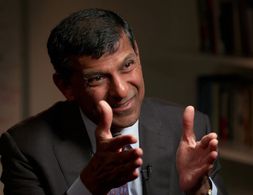✕
156 results
This article outlines the fundamental challenges of democratically planned economies and categorises proposed models into six groups, each of which approaches planning and coordination at different levels of authority and between myriad economic units in a particular way, taking into account efficiency as well as democratic principles and environmental and social sustainability. Through a classification system based on decision-making authority and mediation mechanisms, the article provides a framework for understanding and comparing these models. By examining their different approaches, it offers insights into the complexities and potential paths of democratically planned economies in the 21st century.
A review of:
[1] Intermediate Microeconomics, H.R. Varian
[2] Mikrooekonomie, R.S. Pindyck, D.L. Rubinfeld
[3] Grundzuege der mikrooekonomischen Theorie, J. Schumann, U. Meyer, W. Stroebele
This is an introductory level core course in macroeconomics for those expecting to take further courses in economics. It provides a theoretical and applied approach of introductory macroeconomics, with an international perspective and applications to account for the growing importance of the global economy and the rising openness of economies.
As seen with the United Nations significant promotion of the Sustainable Development Goals (SDGs) in the past few years, the issue of global development is of growing concern to many international organizations. As humanity continues to become more interconnected through globalization, the inequalities and injustices experienced by inhabitants of impacted countries becomes increasingly clear. While this issue can be observed in the papers of different types (e.g., different schools of thought) of economists throughout the world, the work of behavioral and complexity economists offer a unique, collaborative perspective on how to frame decisions for individuals in a way that can positively reverberate throughout society and throughout time.
MERCOSUR (Mercado Común del Sur or Common Southern Market) was the first formalized attempt to integrate South American countries economically and politically.
An essay of the writing workshop on Nigeria’s Readiness for and the Effect of the Fourth Industrial Revolution
This course introduces students to the relevance of gender relations in economics as a discipline and in economic processes and outcomes. The course covers three main components of gender in economics and the economy: (1) the gendered nature of the construction and reproduction of economic theory and thought; (2) the relevance and role of gender in economic decision-making; and (3) differences in economic outcomes based on gender. We wil touch on the relevance of gender and gender relations in at least each of the following topics: economic theory; the history of economic thought; human capital accumulation; labor market discrimination; macroeconomic policy, including gender budgeting; household economics; basic econometrics; and economic crises.
The course will teach students to analyze the goals, implementation, and outcomes of economic policy.
Exploring Economics, an open-access e-learning platform, giving you the opportunity to discover & study a variety of economic theories, topics, and methods.
Recovery from the Covid-19 crisis provides a chance to implement economic measures that are also beneficial from environmental and social perspectives. While ‘green’ recovery packages are crucial to support economies tracking a low-carbon transition in the short-term, green measures such as carbon pricing are also key to improving welfare in the long-term. This commentary specifies the need for carbon pricing, outlines its implications for our everyday lives, and explains how it works alongside value-based change in the context of climate action and societal well-being.
“Economics is the science which studies human behaviour as a relationship between ends and scarce means which have alternative uses1.” This is how Lionel Robbins came to define economics in the early 1930s and there is a good chance that many of you heard a variant of this definition in your first Economics 101 lecture.
The goal of this course is to explore these differences in economic outcomes observed among women and men, measured by such things as earnings, income, hours of work, poverty, and the allocation of resources within the household. It will evaluate women’s perspectives and experiences in the United States and around the world, emphasizing feminist economics.
This course introduces students to political economy and the history of economic thought. We will cover the core ideas in various schools of economic thought, positioning them in the historical and institutional context in which they were developed. In particular, we will cover some economic ideas from the ancient world and the middle ages; the enlightenment; the emergence of and main ideas in classical political economy (Adam Smith, David Ricardo, Thomas Malthus, and others); Marx, Mill, and Keynes; European versus American economic thought through history; the rise of mathematical economics; economic theories around state-managed economies versus socialism; Austrian economics; behavioral economics; and the future of economics.
This course will cover recent contributions in economic history that, using geospatial data from anthropological maps, colonial archives and secondary sources, will explore current economic and development challenges by drawing parallels between the past and present.
Trade disputes are usually understood as conflicts between countries with competing national interests, but as Matthew C. Klein and Michael Pettis show in this book, they are often the unexpected result of domestic political choices to serve the interests of the rich at the expense of workers and ordinary retirees.
Reflecting his own concerns about the contribution economics could make to the betterment of society, Eli Ginzberg published this study of Smith's humanitarian views on commerce, industrialism, and labor. Written for his doctoral degree at Columbia University, and originally published as The House of Adam Smith, the book is divided into two parts.
Over the last decade, the world's largest corporations - from The Coca Cola Company to Amazon, Apple to Unilever - have taken up the cause of combatting modern slavery. Yet, by most measures, across many sectors and regions, severe labour exploitation continues to soar. Corporate social responsibility is not working. Why?
This episode of the Future Histories Podcast featuring Moira Weigel sets the development of digital capitalism and the right-ward shift in politics and society in relation to one another. It provides a masterful combination of ideology critique and polit-economic analysis grounded in comprehensive knowledge of the digital economy.
Environmental catastrophe looms large over politics: from the young person’s climate march to Alexandria Ocasio-Cortez’s Green New Deal, increasing amounts of political space are devoted to the issue. Central to this debate is the question of whether economic growth inevitably leads to environmental issues such as depleted finite resources and increased waste, disruption of natural cycles and ecosystems, and of course climate change. Growth is the focal point of the de-growth and zero-growth movements who charge that despite efficiency gains, increased GDP always results in increased use of energy and emissions. On the other side of the debate, advocates of continued growth (largely mainstream economists) believe that technological progress and policies can ‘decouple’ growth from emissions.
This text provides an easy to understand introduction to complexity economics for non-specialist audiences such as bachelor's students.
Neoclassical economics focuses on the allocation of scarce resources. Economic analysis is mainly concerned with determining the efficient allocation of resources in order to increase welfare.
The term "de-risking" can be seen as one element of a strategy aimed at discursively reframing the trade policy confrontation with China. This confrontation has mainly been driven by the US in recent years and received initially cautious, but later growing support from the EU.
This article explores if power dynamics in the household can be changed, and if so, how. In this context the focus is laid on government childcare policy and its various channels of possible influence.
Deforestation is estimated to be responsible for about 12-29% of global greenhouse gas emissions. This essay will explore ecological economics as an alternative lens through which to approach forest conservation and the acceleration of climate change.
Approaching the law of nature that determines all forms of economy. The bulk of economic theory addresses the economic process by setting out on a catalogue of aspects, seeking the laws in the aspects and hoping to get together a reliable view of the whole.
In this essay the author reviews empirical studies in economics that analyze factors behind the rise of nationalist and populist parties in Western countries. He stresses that economic factors (e.g., trade shocks and economic crisis) play a crucial role in the rise of populist parties; however, the discussion of mechanisms driving this trend remains unsatisfying
An essay of the writing workshop on contemporary issues in the field of Nigerian economics: Labour and all the dynamics, such as laws, mobility, gender participation, regulation etc., that are associated with it cements the need for this paper which seeks to objectively review, analyse, and if deemed necessary, give plausible recommendations.
An essay of the writing workshop on contemporary issues in the field of Nigerian economics: The adverse effect of climate change is overwhelming, not just in Nigeria but globally. Global warming is the result of hostile human activities that have impacted the environment negatively. This is the principal variable the government should tackle through practical innovations such as the acceptable implementation of Adaptation Policies and also through the adequate implementation of environmental tax. These will enhance pro-environmental behaviour which is fit for socio-political and economic activities for sustainability.
This is an overview of (possibly transformative) proposals to address the economic consequences of the corona crisis
Firms are the primary places where economic activity takes place in modern capitalist economies: they are where most stuff is produced; where many of us spend 40 hours a week; and where big decisions are made about how to allocate resources. Establishing how they work is hugely important because it helps us to understand patterns of production and consumption, including how firms will react to changes in economic conditions and policy. And a well-established literature – led by post-Keynesians and institutionalists – holds that the best way to determine how firms work is to…wait for it...ask firms how they work. This a clearly sensible proposition that is contested in economics for some reason, but we’ll ignore the controversy here and just explore the theory that springs from this approach.
Exploring Economics, an open-source e-learning platform, giving you the opportunity to discover & study a variety of economic theories, topics, and methods.
In this video, Rajan Raghuram highlights ‘A hereditary Meritocracy’. He identifies the “limitations” with the current economic systems of democracy and markets.
We use cookies on our website. Click on Accept to help us to make Exploring Economics constantly better!



























